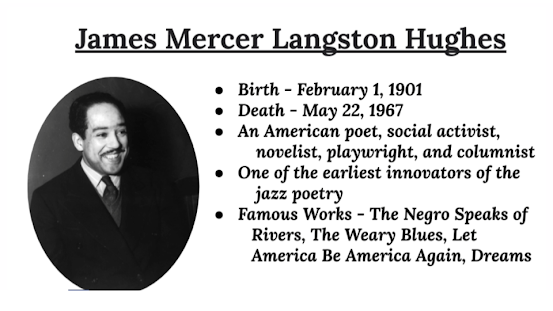Dreams By Langston Hughes
Hold fast to dreams
For if dreams die
Life is a broken-winged bird
That cannot fly.
Hold fast to dreams
For when dreams go
Life is a barren field
Frozen with snow.
INTRODUCTION -
Dreams is a famous poetic work by the American poet Langston Hughes. It was initially published in the magazine The World Tomorrow in 1923. The poem is relatively short, consisting of only eight lines divided into two quatrains. Each quatrain has the rhyme scheme ABCB. The poem, as the title, describes the importance of our dreams. They motivate us to work hard to achieve them. He also tells us about the problems that arise when dreams are hindered.
POET -
James Mercer Langston Hughes (February 1, 1901 – May 22, 1967) was an American poet, social activist, novelist, and playwright. He was one of the earliest innovators of Jazz poetry. His most famous works include Harlem, Mother to Son, The Negro Speaks of Rivers, Let America Be America Again, etc.
SUMMARY -
LINES 1 TO 4 -
In the first line, the speaker urges the reader to hold on tightly to dreams and never give up on them. He compares the pain of life without dreams to the ordeal of an injured bird that can't get off the ground. These dreams are none other than hopes, aspirations, fantasies, and imaginative visions we have in our daily lives. As an injured bird cannot fly due to its wounds similarly, dreams, if lost, give us pain that we cannot handle.
LINES 5 TO 8 -
The speaker again urges the reader to hold on tightly to dreams and give them a vital life position. This time he compares the bleakness of life without dreams to the emptiness of a frozen winter landscape. As a frozen place holds no life or beauty and is disregarded by all, similarly, loss of dreams takes away the happiness and energy from us. So, they are one of the most crucial aspects of our life.
THEMES -
- The Necessity of Dreams - In these eight lines, the poet warns the reader that abandoning dreams (which might mean hopes, aspirations, fantasies, imaginative visions, or illusions) robs life of its vitality and purpose. The poem depicts life without dreams as no longer worth living through the symbolic images of brokenness and barrenness.
END -
Langston Hughes' poems are well known for their depth of thought. This poem is no different. We disregard dreams as some common fantasies which are unable to be fulfilled, but they are more. They are a part of our soul and us.












1 Comments
Quick and easy. Thank You😊
ReplyDelete